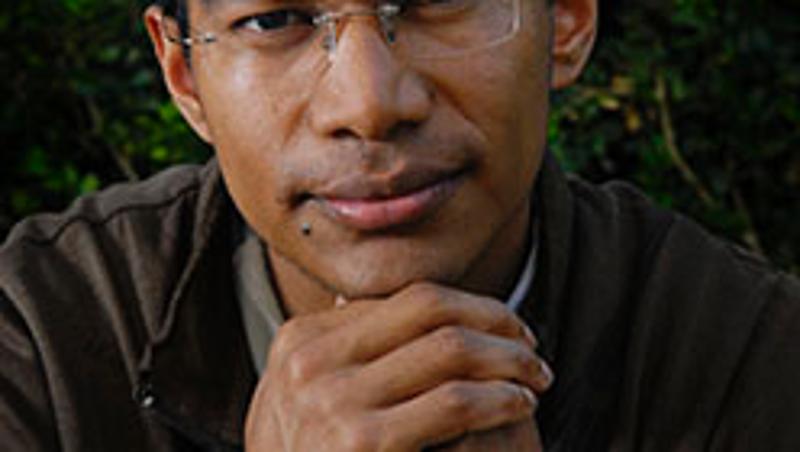
The life-changing power of education was demonstrated with the award of a QUT doctorate to an East Timorese man who dropped out of school at 11 to help support his family while his father was a fugitive fighting for independence.
Dr Juliao Dos Reis received his PhD in Public Health in front of his parents at a QUT graduation last week.
His PhD research in East Timor found that belief in traditional healers, overcrowding, malnutrition and an under-resourced health system contribute to the country's high rate of tuberculosis and the large number of patients who don’t complete the eight-month TB eradication medication.
Dr Dos Reis spent months in his homeland researching the reasons why so many people in this tiny, desperately poor country do not finish their treatment, which is likely to cause them to develop multi-drug resistance to tuberculosis therapy.
In 2014, tuberculosis killed approximately 1.5 million people globally, and 95 per cent of those who die from this preventable and treatable disease are in under-developed countries, more than half in South East Asia.
“TB treatment is quite onerous. With the recent guidelines introduced in East Timor, patients have to go to the clinic every single day for six months for the anti-TB drug,” Dr dos Reis said.
“Although the TB drug is free in East Timor, poverty is another factor for non-completion of the course. More than half the population lives on less than $2 a day and is unemployed.”
“Our study found that, patients experience financial difficulties, and cannot afford the transport costs to and from the clinic nor the extra vitamins they need to overcome malnutrition.
“It is even worse for patients who live some distance away from the available health service with limited access to public transport and family financial support.”
Dr Dos Reis found many factors contributed to non-adherence including: lack of knowledge and understanding about the treatment, poor services from health providers, no caregivers to remind patients to take their medication and social stigma.
“Another influence on medication adherence is ‘chance health locus of control’, a belief system prevalent in East Timor in which one believes that his or her health is controlled by chance, luck or other external power.
“But just as importantly, people in East Timor, as in many under-developed countries, have a strong belief in traditional healers and those who use these healers as a form of health service are less likely to seek early treatment and more likely to drop out of treatment a few months after diagnosis.
“For traditional healers and their patients the cause of disease is nothing to do with bacteria but with dysfunctional human relationships.
“This means a person might ask ‘Am I coughing up blood because my grandparents killed someone?’ and it is the traditional healer’s job to work out which relationship needs to be put right so the person can get better.
“They expect the traditional healer to cast the sickness away and while they wait for it to go they are infecting other people and delaying their chances of getting an early diagnosis.”
Dr Dos Reis said the solution could be for community health workers and health professionals to work collaboratively with the traditional healers.
“Traditional healers have an important role in the patient’s treatment because their patients have so much faith in them and it would be best if they could be identified and be trained to screen for suspected TB, give referrals and dispense treatment.
Dr Dos Reis said high demand and too few health workers contributed to the lack of education of patients which, in turn, tended to drive patients to return to traditional healers or drop out of treatment.
“People can wait all day for treatment. Depending on how many patients they have, health workers might not have time to explain the treatment process and possible side effects,” he said.
“If patients have some side effects they are more likely to turn to a traditional healer to fix them and discontinue their treatment.”
Dr Dos Reis said TB was a global problem and the poorest people were most prone to it.
“Even if you have an infant immunisation program, malnourished people in crowded conditions can still acquire TB.
“Those who do not finish treatment risk developing multi-drug resistant TB and it then takes 24 months of treatment, which is unlikely to be completed if the first course was not.
“Our study has implications for combatting TB worldwide. I found that providing education to the population on TB, providing enough well-trained health workers to service the population and providing financial support would go a long way to help combat this ancient disease which should have become extinct by now.”
Mr Dos Reis completed at Bachelor of Public Health at QUT after graduating from Nudgee College under an Education Queensland scholarship. He has also attained a Postgraduate Certificate in Environmental Health and a Masters in Health. In 2012 he became the first Timorese person to receive an Endeavour Awards Scholarship from the Australian Government to undertake his PhD.
Media contact: Niki Widdowson, QUT Media, 07 3138 2999 or n.widdowson@qut.edu.au
After hours: Rose Trapnell, 0407 585 901 or media.@qut.eud.au.




